 |  |  | |
An up close and personal interview with U.S. Army Veteran and Togetherweserved.com Member:
COL James Pittman U.S. Army (Ret) (1968-2005)
PLEASE DESCRIBE WHO OR WHAT INFLUENCED YOUR DECISION TO JOIN THE ARMY?
My family has always served in the military going back to the Revolutionary War. I had 3 uncles who were in Operation Overlord and hitting Omaha Beach, and my father who served in the Navy and Marine Corps in the Pacific. It was always a "given" that I would someday  serve as well, and when the turbulence of the 1960's and the Vietnam War polarized the nation, I found myself having to make a choice. serve as well, and when the turbulence of the 1960's and the Vietnam War polarized the nation, I found myself having to make a choice.
Although I lived in a small community about 15 miles West of Madison, Wisconsin, I often went down-town with friends. One night, a few of us were walking down the side-walk and we passed an Army Recruiting Office. There was a big poster of a Green Beret jumping out of a C-130 with Giant Letters say " AIRBORNE - ALL THE WAY". Me and a friend decided we would visit the office the next day. The recruiter said if I enlisted Regular Army for 3 years, he could guarantee me Airborne School and I made up my mind to join.
Since I wasn't 18 yet, I had to get my parents permission. When I discussed my intent with my father, he said "The Navy will feed you better and you can probably get a better job in the Air Force". I'm sure he knew what kind of jobs most paratroopers had, as did the Marine Corps, and it was the peak of the Vietnam War in terms of KIA's and WIA's per month. Still he signed, and 20 days after my 18th birthday I found myself showing up at Ft. Campbell, KY for enlisted Basic Combat Training.
WHETHER YOU WERE IN THE SERVICE FOR SEVERAL YEARS OR AS A CAREER, PLEASE DESCRIBE THE DIRECTION OR PATH YOU TOOK.
After finishing Basic, Infantry, and Airborne Training, I attended Special Forces Pre-Selection testing. Four days into training, we were told that if we wanted to volunteer for Vietnam we could do so.  Everyone I knew did so, and a month later I found myself in Vietnam. I served 1 long and 3 short tours of duty in Vietnam, all in Infantry, SF, and combat units. Everyone I knew did so, and a month later I found myself in Vietnam. I served 1 long and 3 short tours of duty in Vietnam, all in Infantry, SF, and combat units.
On my last tour, I had the honor to work with US and Vietnamese units, and I met the woman who was to become my future wife. At the time, the military did everything it could to discourage foreign-marriage, and I was given a choice to either ETS from the military and get married as a civilian or stay in the service and go through the years of red tape. I chose to separate, and in Nov. 1971, I found myself as a civilian. In a couple of months my wife joined me in Wisconsin, and we found ourselves in the middle of the anti-Vietnam war attitude sweeping various parts of the nation.
I decided quickly to get back into the service, and it was 10 months before I could reenlist at the same rank I was before my 1971 separation (Staff Sergeant). I re-upped in Sept, 1972 for 4 years with the 25th Inf in Hawaii, with the intent to assist my wife in assimilating into the US culture and going to college on the GI Bill. Within 4 years, I completed a Bachelors Degree and half of a Masters Degree while on active duty, and I also saw the end of the Vietnam War. I decided to ETS a 2nd time and attend a 2nd graduate program, and this program led to my being commissioned as an officer in 1980.
To quote the Beatles, my military path WAS a "A Long and Winding Road" to say the least.
DID YOU PARTICIPATE IN COMBAT OPERATIONS? IF SO, COULD YOU DESCRIBE THOSE WHICH WERE SIGNIFICANT TO YOU?
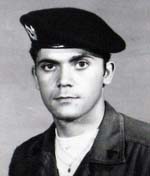 I participated in every major campaign during the Vietnam War conducted from June, 1969 to November, 1971, including the Binh Tay I invasion of Cambodia. I served with the 2nd Infantry Division from 1983-1984, which was the only combat deployed infantry division in the US Army at that time. Provided mission support of forward deployed combat operations in Iraq, Kuwait, Jordan, Egypt, and Israel during the Gulf War, as well as UN and foreign combat support operations in Mozambique, Macedonia, and Bosnia. I participated in every major campaign during the Vietnam War conducted from June, 1969 to November, 1971, including the Binh Tay I invasion of Cambodia. I served with the 2nd Infantry Division from 1983-1984, which was the only combat deployed infantry division in the US Army at that time. Provided mission support of forward deployed combat operations in Iraq, Kuwait, Jordan, Egypt, and Israel during the Gulf War, as well as UN and foreign combat support operations in Mozambique, Macedonia, and Bosnia.
ALL were significant to me since peace-time is one thing within the military and war is quite another. In War, you see the best and the worst in people and experience things that you would normally never experience.
OF ALL YOUR DUTY STATIONS OR ASSIGNMENTS, WHICH ONE DO YOU HAVE FONDEST MEMORIES OF AND WHY? WHICH ONE WAS YOUR LEAST FAVORITE?
My fondest memories are when I was in the 2-504th PIR of the 82nd Airborne Division during peacekeeping duties in the Sinai. The USA had just attacked Libya at the time and the previous unit had been involved in a disaster at Gandar. Tensions were high in the entire Middle 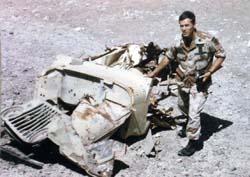 East, with violations of the Camp David Peace Agreement on a daily basis. East, with violations of the Camp David Peace Agreement on a daily basis.
At the time, the 504th was composed of some of the finest soldiers I had ever served with, most veterans of Grenada and Panama, with much of the senior leadership being Vietnam combat vets like myself. The difference in working with an ultra-professional military unit and a normal line unit is night-and day, and this is what makes ANY assignment for a professional soldier great.
The least favorite assignment was my second to the last before I retired. I was a Senior Staff Officer in Germany, with much of the senior staff careerists that were only in it for the pay and rank. Most of the Vietnam era leaders had long since gone, and very few really cared about the individual soldier. The military was right in the middle of it's social re-engineering when 9/11 hit, and I soon found myself supporting combat operations in Iraq and Afghanistan.
What I observed in the early stages of OIF/OEF reminded me of the path we had taken in Vietnam, with pencil-pushers playing leader while people died in the desert. THIS was the worst assignment; having to deal with officers who wore the rank but had not earned the respect - nor cared to.
FROM YOUR ENTIRE SERVICE CAREER WHAT PARTICULAR MEMORY STANDS OUT?
The first time I saw people die in combat.
IF YOU RECEIVED ANY MEDALS FOR VALOR OR AWARDS FOR SIGNIFICANT ACHIEVEMENT, PLEASE DESCRIBE HOW THESE WERE EARNED.
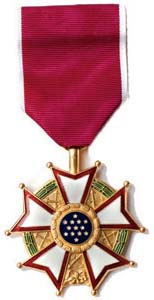 Legion of Merit - For over 33 years of exemplary military service. Legion of Merit - For over 33 years of exemplary military service.
Bronze Stars(2) - For combat action in Vietnam, 1970 and 1971.
Purple Heart - Shrapnel in eye, head, and knees, during operations against the North Vietnamese Army in Vietnam in 1970.
Vietnam Cross of Gallantry - For combat heroism
Meritorious Service Medal(9) - For exceptional meritorious service on 9 different assignments, inclusive years 1980-2005.
OF ALL THE MEDALS, AWARDS, QUALIFICATION BADGES OR DEVICE YOU RECEIVED, PLEASE DESCRIBE THE ONE(S) MOST MEANINGFUL TO YOU AND WHY?
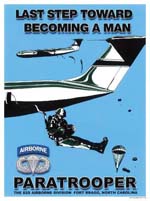 Combat Infantryman's Badge - Can only be earned in the infantry, by an infantry soldier, and only by being in combat. It, more than any other badge, identifies those who have chosen an occupation whose sole function is to meet and destroy the enemy. Combat Infantryman's Badge - Can only be earned in the infantry, by an infantry soldier, and only by being in combat. It, more than any other badge, identifies those who have chosen an occupation whose sole function is to meet and destroy the enemy.
Purple Heart - Can only be earned (at least when I received it) by being wounded in action.
Parachutist Badge - the main reason I enlisted in the Army in 1968. if I hadn't seen a poster advertising Airborne School I might have never taken the path to a military career. Also, the best infantry unit I served with in my career was the 504th PIR, 82nd Airborne Division.
WHICH INDIVIDUAL(S) FROM YOUR TIME IN THE MILITARY STAND OUT AS HAVING THE MOST POSITIVE IMPACT ON YOU AND WHY?
SFC Elmo Tacuban - Platoon SGT, 25th Inf Div. Getting the lower part of his leg shot away in Vietnam and earning a Silver Star in the process, Elmo fought his way back into an active duty infantry job and was one of the most professional and inspirational NCO's I had the honor to serve with.
COL Jack Hook - As the Task Force Commander, 2-504th PIR. A superb leader who always led from the front.
COL Cal Neptune/:LTC Tom Munnel - Officers who gave you a job and then got the hell our of your way and let you do it. Without their leadership and mentoring, I would not have succeeded.
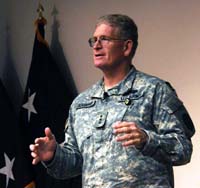 LTG Eric Schoomaker - the most brilliant officer I worked with in over 33 years of service. He knew what a person was capable of and pushed them to accomplish incredible things. He never failed to support his soldiers, and he always had the well-being of soldiers first and foremost. LTG Eric Schoomaker - the most brilliant officer I worked with in over 33 years of service. He knew what a person was capable of and pushed them to accomplish incredible things. He never failed to support his soldiers, and he always had the well-being of soldiers first and foremost.
BG David (Tex) Hill - During my military assignment I had two assignments at Ft. Sam Houston, Texas. On my first assignment, I was driving around looking an apartment to rent, and I saw a tall older man doing yard-work in front of a house that had, from all appearances, once been a mansion of some kind but had been converted into several apartments. There was a "apartment for rent" sign in the front yard, and I stopped to ask him about it. He simply said, "Mazie handles the apartments, call her and she can tell you about it". Later on, I called the number, and a woman identifying herself as Mazie Hill gave me the particulars, which suited my needs, and she said I could drop off the security deposit at her home.
Later, I went to the address she had provided, and pulling into the drive-way, I noticed a wind-vane in the shape of a P-40 on the roof. 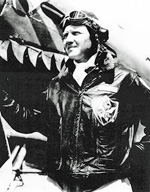 I rang the door-bell and the same old guy who I had seen in the yard answered the door and invited my into his office. He immediately asked me if I wanted something to drink, and I did, and while he went to get our drinks, I started looking around the room It was FULL of WW2 memorabilia; a large propeller prop, books, photos, and model airplanes. As I looked around, I noticed on the wall to my left a large picture with 30 or 40 people, with many having signatures on the picture. I got up for a larger look and then noticed the names, Claire Chennault, Madame Chang Kai Shek, and lots of guys in WW II era fighter pilot uniforms. I rang the door-bell and the same old guy who I had seen in the yard answered the door and invited my into his office. He immediately asked me if I wanted something to drink, and I did, and while he went to get our drinks, I started looking around the room It was FULL of WW2 memorabilia; a large propeller prop, books, photos, and model airplanes. As I looked around, I noticed on the wall to my left a large picture with 30 or 40 people, with many having signatures on the picture. I got up for a larger look and then noticed the names, Claire Chennault, Madame Chang Kai Shek, and lots of guys in WW II era fighter pilot uniforms.
Then it hit me, I was in the home of "TEX HILL", one of the most famous Flying Tigers. In a bit, Tex came back, and I commented that I was really honored to meet him. We spent quite a lot of time talking about some of his harrowing experiences, and then he asked me about my military career. When I told him that I had been to Vietnam in the infantry, he shook his head, took a sip from his glass, and simply said, " that was a bad one, the stuff you men me put up with when you came home was bad, I'm glad I wasn't in that one and happy you made it home." Here was a man who had shot down around 18 Japanese planes, seen the horrors inflicted on the Chinese in the early stages of what was to become WW II, and had received the DSC giving me one of the first "welcome homes" I ever received as a Vietnam Vet. During the ensuing years, Tex and Mazie Hill often provided me stories of their experiences, the challenges they faced as a military family, their travels, along with Tex and I even shared hunting stories.
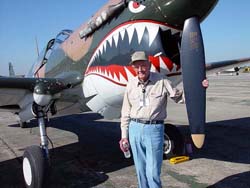 Those moments with Tex and Mazie and their recollections helped me deal later on with some of the challenges I was yet to face in my own career. When he finished his book "Tex Hill Flying Tiger", I made sure it was available at the AMEDDC&S Book Store, We talked about much of the events in the book, usually when something needing fixing in my apartment or on occasion with Mazie at the real estate company where she worked. When I retired in 2005 and left San Antonio, leaving Tex and Mazie was like leaving a Great Aunt and Uncle. They were the epitome of all that was great with the greatest generation and an inspiration to everyone who had the honor to meet them. Those moments with Tex and Mazie and their recollections helped me deal later on with some of the challenges I was yet to face in my own career. When he finished his book "Tex Hill Flying Tiger", I made sure it was available at the AMEDDC&S Book Store, We talked about much of the events in the book, usually when something needing fixing in my apartment or on occasion with Mazie at the real estate company where she worked. When I retired in 2005 and left San Antonio, leaving Tex and Mazie was like leaving a Great Aunt and Uncle. They were the epitome of all that was great with the greatest generation and an inspiration to everyone who had the honor to meet them.
CAN YOU RECOUNT A PARTICULAR INCIDENT FROM YOUR SERVICE WHICH MAY OR MAY NOT HAVE BEEN FUNNY AT THE TIME, BUT STILL MAKES YOU LAUGH?
In Vietnam, I often worked out of a Bahnar Montanyard village in the Central Highlands. On occasions, rather than staying at night inside the fortified A-Site, I would spend the night with one of the Montanyard families. For all practical purposes, the Bahnar in this village were very primitive, living 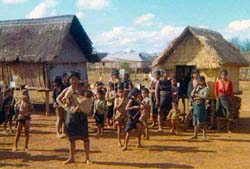 in bamboo and thatch huts on stilts (to keep predators, human and animal away), and using cross-bows, spears, and traps to hunt and cultivating some wild pineapple and rice. Usually when staying with a Bahnar family, they would offer you rice wine made from fermented rice and sometimes quite potent and sometimes small bits of mystery meat or fruit. in bamboo and thatch huts on stilts (to keep predators, human and animal away), and using cross-bows, spears, and traps to hunt and cultivating some wild pineapple and rice. Usually when staying with a Bahnar family, they would offer you rice wine made from fermented rice and sometimes quite potent and sometimes small bits of mystery meat or fruit.
One night I was in a hut with another team member when an old woman in the family approached the mud-fire pit that served to keep the hut warm (it did get cold during the monsoons) and to keep mosquitoes away with the smoke that usually filled the entire hut.
The old woman threw something into the fire and then retrieved a gourd with a banana leaf stopper. She got two fire hardened clay cups, pulled the leaf out, and poured some very red, very thick liquid into the cups. In the dim light of the hut, it looked like blood. 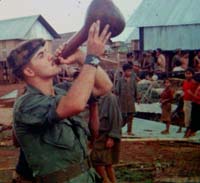 She then motioned for us to drink, and we put the cups to our lips expecting the worse. Instead, we found the liquid was strawberry Kool Aid with a LOT of sugar mixed in. Just as I was going to say something to my friend, I heard a popping sound. Looking over to the fire, I saw popcorn popping out all over the place, which, the old woman gathered up and gave to us. She had probably gotten the Kool Aid from some US soldiers at one time or another, and heaven knows where she got the popcorn. All I can recall is thinking at the time how weird it was to be in a stone-age village, in the middle of the jungle, in the middle of a war, drinking Kool Aid and eating popcorn. She then motioned for us to drink, and we put the cups to our lips expecting the worse. Instead, we found the liquid was strawberry Kool Aid with a LOT of sugar mixed in. Just as I was going to say something to my friend, I heard a popping sound. Looking over to the fire, I saw popcorn popping out all over the place, which, the old woman gathered up and gave to us. She had probably gotten the Kool Aid from some US soldiers at one time or another, and heaven knows where she got the popcorn. All I can recall is thinking at the time how weird it was to be in a stone-age village, in the middle of the jungle, in the middle of a war, drinking Kool Aid and eating popcorn.
The village is long gone, and the fate of the Bahnar whom I loved and admired unknown, but that night in the hut still brings a smile to me.
WHAT PROFESSION DID YOU FOLLOW AFTER YOUR MILITARY SERVICE AND WHAT ARE YOU DOING NOW? IF YOU ARE CURRENTLY SERVING, WHAT IS YOUR PRESENT OCCUPATIONAL SPECIALTY?
 I retired in 2005 after 36 years of government service (33 active duty, 1 year reserve, and 2 years civil service). I did some consulting work for the US Army under contract, but as the war's in Iraq and Afghanistan went on, I pulled away from doing any work for the government. I currently design treks and tours to the Peruvian Amazon, and spend a lot of time hunting and traveling world-wide. I retired in 2005 after 36 years of government service (33 active duty, 1 year reserve, and 2 years civil service). I did some consulting work for the US Army under contract, but as the war's in Iraq and Afghanistan went on, I pulled away from doing any work for the government. I currently design treks and tours to the Peruvian Amazon, and spend a lot of time hunting and traveling world-wide.
WHAT MILITARY ASSOCIATIONS ARE YOU A MEMBER OF, IF ANY? WHAT SPECIFIC BENEFITS DO YOU DERIVE FROM YOUR MEMBERSHIPS?
Ivy Dragoons, 4th Infantry Division Association.
IN WHAT WAYS HAS SERVING IN THE MILITARY INFLUENCED THE WAY YOU HAVE APPROACHED YOUR LIFE AND YOUR CAREER?
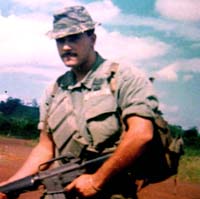 As a very young man in the jungles of Vietnam, I learned that life is fleeting, and as some say, "has an expiration date." Vietnam taught me to trust in my friends and not governments, to treat soldiers as I would have wanted to be treated. Being a soldier is not about rank, power, or influence, but rather being able to do any job in any situation and know that your fellow soldiers respect you enough to trust in your judgment. As a very young man in the jungles of Vietnam, I learned that life is fleeting, and as some say, "has an expiration date." Vietnam taught me to trust in my friends and not governments, to treat soldiers as I would have wanted to be treated. Being a soldier is not about rank, power, or influence, but rather being able to do any job in any situation and know that your fellow soldiers respect you enough to trust in your judgment.
I also learned to value every minute of every day and that the most important thing in life is family.
BASED ON YOUR OWN EXPERIENCES, WHAT ADVICE WOULD YOU GIVE TO THOSE WHO HAVE RECENTLY JOINED THE ARMY?
I would advise them to remember that when you serve, you have made a conscious decision to support something larger than yourself, a decision that may cost you your life. It's not about pay, benefits, rank, or what you can get out of it--it's about serving your country, your friends,  and doing the best job you can. The military exists to wage war - never forget that. I would also tell them to strive for excellence and to work at becoming the best soldier and leader they can. and doing the best job you can. The military exists to wage war - never forget that. I would also tell them to strive for excellence and to work at becoming the best soldier and leader they can.
There are soldiers that have three year careers and those than have 40; there those that prefer enlisted ranks, and those that want to be officers. Don't get bogged down in an MOS or rank structure if you want to do something else. Go for it! The trick is to stay as long as you can faithfully serve, always seek the hard jobs and be a soldier first and whatever second, and get out when you physically can't "hang" anymore or are starting to get angry or bitter. The military isn't for everyone.
IN WHAT WAYS HAS TOGETHERWESERVED.COM HELPED YOU REMEMBER YOUR MILITARY SERVICE AND THE FRIENDS YOU SERVED WITH.
It has provided connections to units and friends that I haven't talked to or seen for years.
|
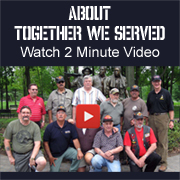


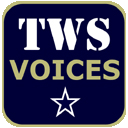
Read Other Interviews in the TWS Voices Archive | Share this Voices Edition on:


  |
|
TWS VOICES
Voices are the personal stories of men and women who served in the US Military and convey how serving their Country has made a positive impact on their lives. If you would like to participate in a future edition of Voices, or know someone who might be interested, please contact TWS Voices HERE.
This edition of Army Voices was supported by:

Army.Togetherweserved.com
For current and former serving Members of the US Army, US Army Reserve and US Army National Guard, TogetherWeServed.com is a unique, feature rich resource helping Soldiers re-connect with lost Brothers, share memories and tell their Army story.
To join Army.Togetherweserved.com, please click HERE.
| |